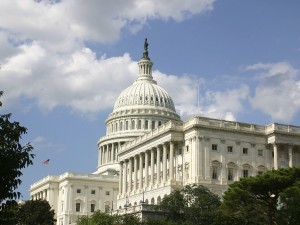This week, Congress has begun to take up a long-awaited funding extension. New leadership has been named elsewhere for the House Education and the Workforce Committee while the Administration shares STEM and rural education resources.
Lawmakers Propose Funding Extension
 As shared previously, Congress has remained in session over the last few weeks, working to organize itself for the 119th Congress and attend to a wide array of end-of-the-year agenda items. Top on this list is determining a path forward on federal fiscal year 2025 (FY25) funding before current legislation is set to expire this Friday, December 20. Earlier today, lawmakers announced that they had reached an agreement on another three-month continuing resolution (CR), which will extend federal funding at current FY24 levels through mid-March of next year. The CR would provide lawmakers with additional time to determine full-year funding for FY25 in the next Congress when Republicans will have control of both the House and Senate.
As shared previously, Congress has remained in session over the last few weeks, working to organize itself for the 119th Congress and attend to a wide array of end-of-the-year agenda items. Top on this list is determining a path forward on federal fiscal year 2025 (FY25) funding before current legislation is set to expire this Friday, December 20. Earlier today, lawmakers announced that they had reached an agreement on another three-month continuing resolution (CR), which will extend federal funding at current FY24 levels through mid-March of next year. The CR would provide lawmakers with additional time to determine full-year funding for FY25 in the next Congress when Republicans will have control of both the House and Senate.
Notably, the CR includes a number of additional pieces of pending legislation and other assorted proposals. Advance CTE continues to analyze this legislation for other important components and will share additional details as they become available. The CR is expected to be considered on an accelerated timeline this week and is widely expected to pass ahead of the December 20 deadline.
Walberg to Chair House Committee on Education and Workforce
Last week, the House Republican Steering Committee met to determine new leadership for the House Education and the Workforce (E&W) Committee. Longtime E&W Chair Virginia Foxx (R-NC) has been term-limited in the new 119th Congress under House Republican Conference rules. Both Reps. Tim Walberg (R-MI) and Burgess Owens (R-UT) have been vying for the E&W Chair role since Foxx’s announcement earlier this year. Ultimately, the steering committee selected Rep. Walberg for this critical role overseeing education and workforce development policy. “We have a unique opportunity to make substantive reforms to empower parents, incentivize workforce training, improve government efficiency, and unburden American innovators and job creators. The American people have given us a mandate to enact meaningful change and ensure future generations will succeed,” Walberg, a longtime committee member, said after the announcement.
White House Publishes STEM Education Strategy
Last week, the Committee on Science, Technology, Engineering, and Math (STEM) under the National Science and Technology Council shared a new resource aimed at helping to grow STEM education and talent over the next five years. The vision for the resource, the Federal Strategic Plan for Advancing STEM Education and Cultivating STEM Talent, is to inspire and cultivate a diverse STEM workforce and ensure equitable access to STEM opportunities for all Americans. The plan emphasizes multi-sector partnerships, ensuring access, opportunity, transparency and accountability. Through the outlined principle of STEM training and workforce development, the strategy references Career Technical Education (CTE) and local community colleges as a direct means of building the STEM workforce needed for the future.
ED Guidance on Rural Teaching Shortages
Last week, the U.S. Department of Education (ED) released a report as part of the initiative to support a stronger educator workforce titled “Raise the Bar: Supporting Rural Communities.” The report remarks on the vitality of rural schools to their communities that face consistent educator shortages and highlights specific state examples of practical solutions to build local talent, increase compensation, and enhance working conditions. Registered teacher apprenticeship opportunities and “Grow Your Own” programs are key ways CTE can support local candidates in filling teaching roles. ED encourages using federal funds through Title I and II, the Rural Education Achievement Program (REAP), Career and Technical Education State Grants, and other funding streams to support rural schools with essential funding to support learners.
Labor Grants for Youth Job Training for High-Demand Careers
Last week, the Department of Labor (DOL) announced that grants were awarded to organizations across 31 states to provide training and employment services to expand access to Registered Apprenticeship Programs (RAPs). The awards are intended to prepare younger workers for quality jobs in high-demand careers through pre-apprenticeships. The YouthBuild Program, supported by the Workforce Innovation and Opportunity Act (WIOA), aims to engage young learners aged 16 to 24 who are not enrolled in school or employed in the workforce. The program divides learners’ time between classroom instruction to earn a high school diploma or equivalent degree and work-based training to prepare for careers. It also provides support services like childcare, transportation assistance, and the provision of work attire and personal protective equipment. Read more about the YouthBuild Program here.
Odds & Ends
- Partnership Between Departments of Education and Agriculture Expands Supplemental Nutrition Assistance Program (SNAP) for College Students
- DOL Announces New Community for Infrastructure Grants and Related Technical Assistance
- President Biden Signs FAFSA Deadline Bill Into Law, requiring October 1 Annual Release of Application for Federal Student Aid
- Biden-Harris Administration Invests Brownfield Job Training Grants in Environmental Job Training Programs Nationwide
Rob Young, Communications & Advocacy Associate
Steve Voytek, Policy Advisor


 As
As 